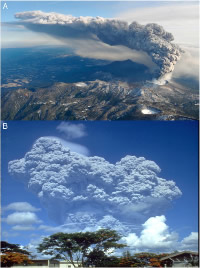Uncertainty quantification and sensitivity analysis of volcanic columns models: Results from the integral model PLUME-MoM
de’ Michieli Vitturi M., S.L. Engwell, A. Neri, and S. Barsotti.
Journal of Volcanology and Geothermal Research, 326, 77–91, http://dx.doi.org/10.1016/j.jvolgeores.2016.03.014.
Abstract
The behavior of plumes associated with explosive volcanic eruptions is complex and dependent on eruptive source parameters (e.g. exit velocity, gas fraction, temperature and grain-size distribution). It is also well known that the atmospheric environment interacts with volcanic plumes produced by explosive eruptions in a number of ways. The wind field can bend the plume but also affect atmospheric air entrainment into the column, enhancing its buoyancy and in some cases, preventing column collapse. In recent years, several numerical simulation tools and observational systems have investigated the action of eruption parameters and wind field on volcanic column height and column trajectory, revealing an important influence of these variables on plume behavior. In this study, we assess these dependencies using the integral model PLUME-MoM, whereby the continuous polydispersity of pyroclastic particles is described using a quadrature-based moment method, an innovative approach in volcanology well-suited for the description of the multiphase nature of magmatic mixtures. Application of formalized uncertainty quantification and sensitivity analysis techniques enables statistical exploration of the model, providing information on the extent to which uncertainty in the input or model parameters propagates to model output uncertainty. In particular, in the framework of the IAVCEI Commission on tephra hazard modeling inter-comparison study, PLUME-MoM is used to investigate the parameters exerting a major control on plume height, applying it to a weak plume scenario based on 26 January 2011 Shinmoe-dake eruptive conditions and a strong plume scenario based on the climatic phase of the 15 June 1991 Pinatubo eruption.
http://www.sciencedirect.com/science/article/pii/S0377027316300269


